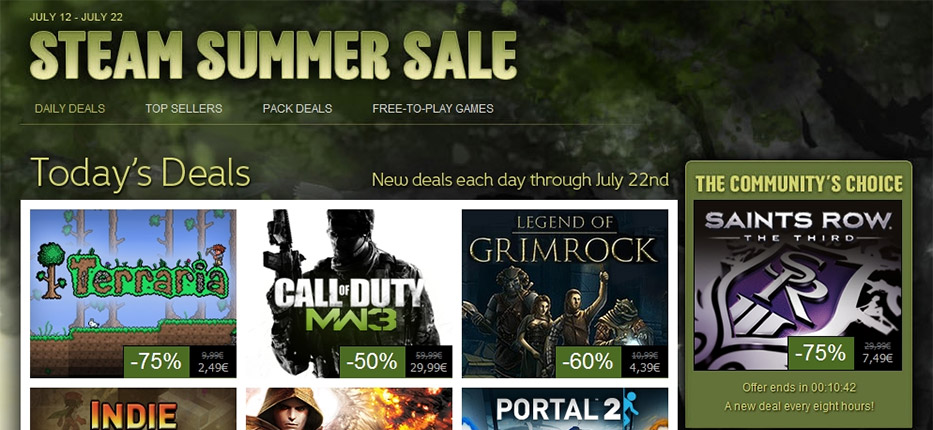The following article is intended as a general rebuttal of Polygon’s recent opinion piece on Steam. It is largely intended to address the underlying assumption that companies are designed for anything other than the maximization of profits, as well as addressing within the flow of the article a few major contentions Polygon expressed with Steam and Valve.
Recently, Polygon released an opinion piece accusing Valve of creating an “abusive” relationship with consumers and debunking the “Nice Guy Valve” image they claim the company has attempted to put forth. A great deal of this argument centered on Valve’s business practices regarding returns on Steam, requiring consumers to download Steam with the games (if they haven’t already), and the cost of hosting a game on Steam.
All of these comments, particularly those accusing Valve of unfairly taking advantage of the consumer’s “free labor,” would definitely make Karl Marx proud, but a quick lesson in simple free market economics and a look at what Valve offers the indie gaming community in particular will demonstrate Valve has been a boon to the gaming community even if their business model could use some improvement.
Let us start with the simple statement that corporations are not your friends. They are not designed to be your friends. Companies exist for two reasons: to make money and provide a service (or services) either needed or desired by consumers. In turn, these companies create jobs that help other people have a way to make money for themselves. The company has a right to enact policies that benefit the company because they are the ones providing the jobs and the ones who took the huge investment risk in starting, building and maintaining a successful company.
Consumers also have a right not to buy and workers have a right not to work there. A company will fail if it’s services are no longer needed, if workers are not motivated to stay, and if consumers take their money elsewhere. Therefore, the question is not whether Valve is being “friendly”, but whether something they are doing is a beneficial business model. If Valve wants to make money through Steam, then they have to juggle money they spend versus money they make and keeping the services they offer in demand.
Let us look at what services Valve is providing through Steam and then determine if Valve’s business model is justified, or if they are truly unhealthy for the gaming community.
Steam Offers an Efficient Sales Model for Developers

Photo Credit: https://i.ytimg.com/vi/YkbjkIot_hU/maxresdefault.jpg
Even with the ease of site development offered by a myriad of online blogs, and even with social media, a developer still has a hard road ahead if they want to get their name out there. Not to mention that even if the developer excels at game creation, marketing is not necessarily a part of their skillset. Steam offers a place for a developer to advertise that is not only organized and pre-developed, but puts the game onto a platform already used by millions of gamers. Part of the cost of putting your game on Steam is the cost of using Valve’s service for advertising your title in an efficient and effective fashion that gets the title onto a platform that has already earned a massive consumer base. For indie developers in particular, this is a service that allows small studios to instantly reach an audience likely far out of their reach otherwise.
Steam’s Greenlight program benefits the gaming community in two ways. It gives the gamers some power over which games Steam offers. It also gives developers a chance to advertise their product and take in a large helping of consumer feedback they otherwise might not be privy to if advertising the game on a smaller platform.
Steam Offers Download Hosting
Small development studios already have the added difficulty of acquiring the needed funding. Add to that the cost of hosting/keeping up a server or dealing with how to host the downloads in a way that provides the proper bandwidth needed for hundreds or possibly thousands of downloads from their site and you have another barrier to their ability to distribute their title. Steam offers this like all of their services at the cost of some of the sales profits, but the benefit is that the title is out there and can be widely distributed with greater ease and possibly lower cost for the developer.
Steam Offers Protection from Piracy

One reason Valve requires Steam to be downloaded with first use and implemented as the user interface to run all titles downloaded through them isn’t so Valve can force you to download their system against your will for pure kicks and giggles, but to protect creators from having their titles pirated. While there are already other services similar to steam that require this for the same reason, not all developers can afford to do this nor would many people be willing to download a new user interface for a small, unknown studio title.
Sure, no one has yet been able to fully prevent piracy, but Steam has been largely effective and therefore a boon and a protection for indie game developers in particular who might otherwise suffer at the hands of people willing to take advantage of them.
Steam Offers Customer Service
Sure, not all issues you run across will have anything to do with Steam’s UI, but as far as anything that affects your gaming experience that is tied to Steam itself, they do offer customer service. This means you will have a UI that is better maintained than others. While this might not affect the developers quite as directly, it is a potential draw for consumers and certainly a service needed to keep them around. An argument could be made for customer service improvements, but it is a necessary service that if implemented well can drive up customer satisfaction and therefore sales.
Final Issue: Valve’s Return Policy
One other thing the Polygon article addressed was Valve’s Steam return policy. I personally do not believe companies are required to take returns, especially if the consumer is made aware that the company does not take returns, or will only take them under certain conditions. It was and still is common practice for game retailers not to take a game back after its case has been opened. This is partially done to help prevent piracy. If a consumer is aware of this, then they take that chance when choosing to make a purchase. Valve, therefore, does not need to take a return if they have made a customer aware of their policy, and particularly if this policy is intended to protect Valve and the developers who host their titles on Steam.
In a world where it is now quite common to have demos available prior to purchase, screenshots, trailers, coverage for larger titles, and consumer reviews easily accessible from Steam itself, there is no good reason to buy a title blindly.
However, there are sometimes issues that crop up after purchase, particularly for early adopters. This is why consumers have a choice. You can wait until enough reviews have been posted to see if issues will crop up. Or, you can take the risk of being an early adopter. It is all about choice for both the consumer and developer. If a developer tends to release buggy titles, then consumers will start shying away from them. No money means no future products.
Valve does, according to their site, offer refunds under certain conditions and given the fact they are dealing with digital content that is vulnerable to pirating and unwanted modification, it seems to go beyond what one should reasonably expect.
Is Valve Justified?

Photo Credit: http://i1-news.softpedia-static.com/images/news2/Steam-Sales-Benefit-Games-Independent-Developers-Say-2.jpg
The worst thing one can do to a free market is overregulating. In fact, overregulating developers like Valve and how they run Steam is the best way to stifle the gaming community. The article claims Valve is being greedy by taking 30 percent of sales profits, but are they?
Well, that depends on several factors including whether the cost is so high that developers (small ones in particular) are losing money or shying away, which doesn’t appear to be the case. If they were, then it might not be the best business model for Valve and they would have to reconsider because the lack of clients could cause loss of profits. Of course, Valve has to make money as well – not only to keep Steam running and growing, but to make a profit (which, again, is the goal of a corporation regardless of their services). Not to mention, if Valve actually does take 30 percent of sales profits, that is a relatively standard figure for distribution sites like Steam.
If Valve’s business model is not the best for consumers or developers, the greatest way to fight back is offering more choices and making good ones. Steam already has a few competitors, though none have yet reached the same level of fame and success. Competition drives innovation and the development of business practices that better benefit the consumer in order to bring them over from the competitor. As a consumer, we can choose where to spend our money. Even if that means (I know this might be difficult to swallow) not buying that game you really wanted because you don’t like the policy of the distributer.
There’s no doubt Steam has posed as an asset for the indie gaming industry in particular, and thus a huge benefit to the gaming community at large. As competition with Steam grows, more benefits for the indie community will likely grow as well. Consumers will also have more choices on where to spend their money, and companies will compete for consumers with different policies and deals designed to reel them in. The possibilities are only limited by drive, creativity and, as always, personal choice.

Photo Credit: http://d2rormqr1qwzpz.cloudfront.net/photos/2012/08/08/39548-steam_store.jpg
In the end, Valve is not our friend, and it is best for the gaming community that they aren’t. No consumer with an understanding of free market economics would expect a for-profit company to build their business model off of pure altruism (which isn’t realistically sustainable). If a business acts ethically, then they might draw more consumers and more dedicated workers, but a corporation’s goal is profit maximization and they are modeled in a way that is meant to support that goal.
If you don’t like it, don’t buy from them. Or, go and build a company to compete with them. But, let us not be so naive to believe that a company that doesn’t cater to our whims is necessarily acting in an immoral or unfair manner.
No, Valve is not your friend, but their free market mentality has made them a huge success, as well as serving as an opening for the gaming community to access new experiences they might not have had were indie developers not given the opportunity Steam has offered.









